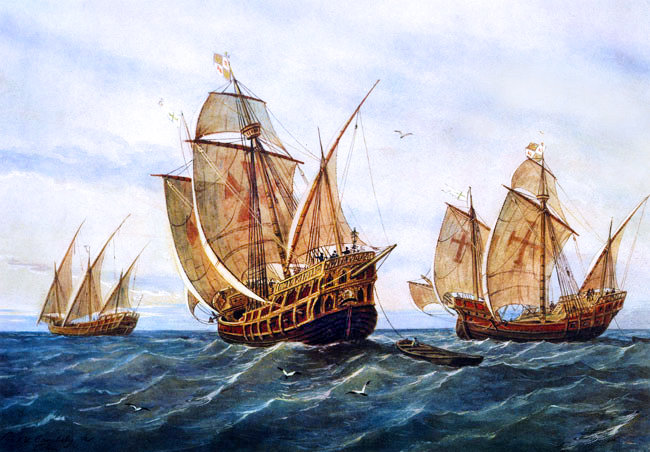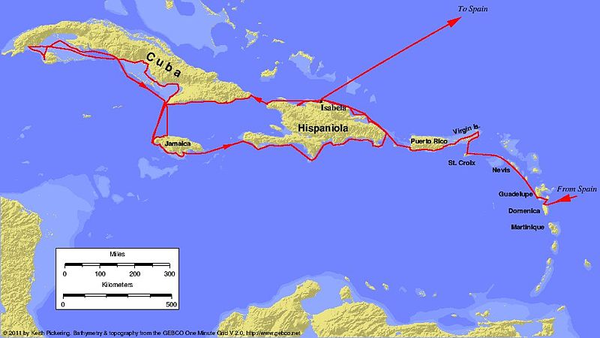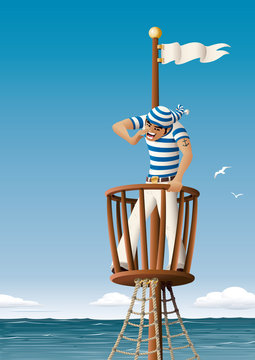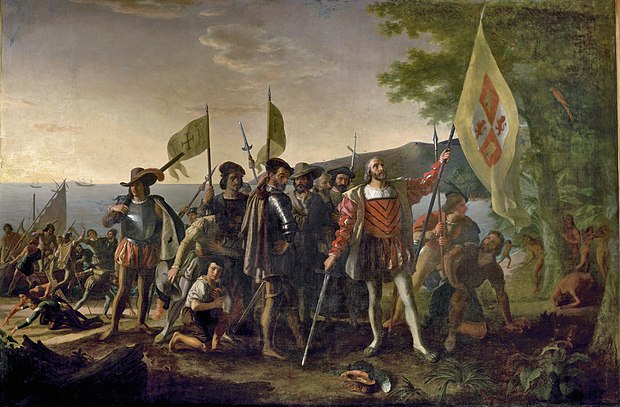|
Born to be mild
Join Date: Oct 2008
Location: 404 Not Found
Posts: 26,996
|

 First Voyage
First Voyage
Columbus had of course no problem securing crew for the three caravels (old sailing ships) he had been granted for the voyage. Every able-bodied man was ready and eager to face the unknown, sail into uncharted seas and brave the monsters of the deep, spend years away from their families in search of a land which might not even exist, and if it did, might very well be hostile. The prospect of dying at sea filled the sailors with… well, you know where I’m going with this, don’t you? There was in fact fierce resistance to and reluctance for the voyage, and it was only through the efforts of his main supporters and friends, the Pinzon brothers, respected sailors and merchants who announced they would personally travel on the voyage, that doubts were removed.
The three ships are known to history as having been the Santa Maria, Columbus’s flagship and the largest of the three, the Nina and the Pinta. It seems the Santa Maria was originally called Gallego, but Columbus had its name changed (thought that was something superstitious sailors avoided, believing it was bad luck?) and the entire crew of 120 men set sail on the morning of August 3, Columbus marking the beginning of the great voyage in his log:
"Friday, August 3, 1492. Set sail from the bar of Saltes at 8 o'clock, and proceeded with a strong breeze till sunset sixty miles, or fifteen leagues south, afterward southwest and south by west, which is in the direction of the Canaries."
As an aside, this really was the answer to the sixty-four thousand dollar question, as it seems that is the equivalent in today’s money as to how much the Crown shelled out for the enterprise. First port of call was to be the Canaries, and as it happened they had to pull in here anyway as the rudder of the Nina broke, believed to be sabotage by its owners, from whom it was taken by the Crown as a fine, or possibly the sailors themselves, afraid of the voyage. Either way, it was repaired and the small fleet set out again on September 6 for a six-week voyage west. On September 16 they arrived in what would become known as the Sargasso Sea, where large clumps of green seaweed floated, Now that they were out in the unknown, Columbus worried about mutiny if his crew were to discover how far from home they actually were, and so he fudged the figures, writing one distance travelled in the log, another, the true one in his personal journal. So he would write in his journal, “Travelled fifty-five leagues, wrote only forty-eight.” A dangerous game to play, if his crew should discover he was lying to them.

He may have been made Admiral of the Oceans by Isabella, but while he had travelled widely Columbus’s blunders were many. He notes that they must be near land on September 20, as he spots a whale and considers they always stay near the coast, which is of course about as far from the truth as you can get. Two days later the trade winds, which had continued to push them west, changed, overtaken by a headwind which helped slow them down, his crew fearing perhaps they would sail off the edge of the world, or at least never see home again, having been blown so far from Spain. However, proving that it was not only the Admiral who could make a knob of himself, Martin Pinzon, in charge of the Pinta, shouted out on September 25 that he had spotted land, and headed towards it, only to find it was in fact a bank of fog.
Nevertheless, increasing flocks of seabirds showed them they were in fact coming closer to land, though Columbus believed this to be the coast of Asia, or the islands around it, when in fact it was the Bahamas. On October 10 the event which has been called in history the mutiny on board Columbus’s ship took place, but according to his own journal it was never anything close. Sure, the men were scared and fed-up, not having sighted land despite their captain’s constant assurances, but he doesn’t seem to have had any real fear that there would be any sort of mutiny. He writes:
"The seamen complained of the length of the voyage. They did not wish to go any farther. The Admiral did his best to renew their courage, and reminded them of the profits which would come to them. He added, boldly, that no
complaints would change his purpose, that he had set out to go to the Indies, and that with the Lord's assistance he should keep on until he came there."
The very next day, they sighted land. Again, from his journal:
"Oct. 11, course to west and southwest. Heavier sea than they had known, pardelas and a green branch near the caravel of the Admiral. From the Pinta they see a branch of a tree, a stake and a smaller stake, which they draw in, and which appears to have been cut with iron, and a piece of cane. Besides these, there is a land shrub and a little bit of board. The crew of the Nina saw other signs of land and a branch covered with thorns and flowers. With these tokens every-one breathes again and is delighted. They sail twenty-seven leagues on this course.

The Admiral orders that they shall resume a westerly course at sunset. They make twelve miles each hour; up till two hours after midnight they made ninety miles. The Pinta, the best sailer of the three, was ahead. She makes signals, already agreed upon, that she has discovered land. A sailor named Rodrigo de Triana was the first to see this land. For the Admiral being on the castle of the poop of the ship at ten at night really saw a light, but it was so shut in by darkness that he did not like to say that it was a sign of land. Still he called up Pedro Gutierrez, the king's chamberlain, and said to him that there seemed to be a light, and asked him to look. He did so and saw it. He said the same to Rodrigo Sanchez of Segovia, who had been sent by the king and queen as inspector in the fleet, but he saw nothing, being indeed in a place where he could see nothing.
After the Admiral spoke of it, the light was seen once or twice. It was like a wax candle, raised and lowered, which would appear to few to be a sign of land. But the Admiral was certain that it was a sign of land. Therefore when they said the 'Salve,' which all the sailors are used to say and sing in their fashion, the Admiral ordered them to look out well from the forecastle, and he would give at once a silk jacket to the man who first saw land, besides the other rewards which the sovereigns had ordered, which were 10,000 maravedis, to be paid as an annuity forever to the man who saw it first. At two hours after midnight land appeared, from which they were about two leagues off.

It was in fact an island, and it wasn’t long before they caught sight of people, natives, the first to encounter Europeans, or at least, Europeans who were about to enslave, annihilate or forcibly convert them. Although land was sighted on October 11, they did not reach it till the next day, therefore the actual discovery day is taken as being October 12, 1492. After Columbus, the two Pinzons and a landing party (sorry) had taken possession of the new land - which he called San Salvador, and by which name it is still known today - for Ferdinand and Isabella, the rest of the story is best described by the Admiral himself.
"So that they may feel great friendship for us, and because I knew that they were a people who would be better delivered and converted to our Holy Faith by love than by force, I gave to someof them red caps and glass bells which they put round their necks, and many other things of little value, in which they took much pleasure, and they remained so friendly to us that it was wonderful. Afterwards they came swimming to the ship's boats where we were. And they brought us parrots and cotton-thread in skeins, and javelins and many other things. And they bartered them with us for other things, which we gave them, such as little glass beads and little bells. In short, they took everything, and gave of what they had with good will. But it seemed to me that they were a people very destitute of everything.
They all went as naked as their mothers bore them, and the women as well, although I only saw one who was really young. And all the men I saw were young, for I saw none more than thirty years of age; very well made, with very handsome persons, and very good faces; their hair thick like the hairs of horses' tails, and cut short. They bring their hair above their eyebrows, except a little behind, which they wear long, and never cut. Some of them paint themselves blackish (and they are of the color of the inhabitants of the Canaries, neither black nor white), and some paint themselves white, and some red, and some with whatever they can get. And some of them paint their faces, and some all their bodies, and some only the eyes, and some only the nose.
They do not bear arms nor do they know them, for I showed them swords and they took them by the edge, and they cut themselves through ignorance. They have no iron at all; their javelins are rods without iron, and some of them have a fish's tooth at the end, and some of them other things. They are all of good stature, and good graceful appearance, well made. I saw some who had scars of wounds in their bodies, and I made signs to them (to ask) what that was, and they showed me how people came there from other islands which lay around, and tried to take them captive and they defended themselves. And I believed, and I (still) believe, that they came there from the mainland to take them for captives.
They would be good servants, and of good disposition, for I see that they repeat very quickly everything which is said to them. And I believe that they could easily be made Christians, for it seems to me that they have no belief. I, if it please our Lord, will take six of them to your Highnesses at the time of my departure, so that they may learn to talk. No wild creature of any sort have I seen, except parrots, in this island."
All these are the words of the Admiral, says Las Casas. The journal of the next day is in these words:
Saturday, October 13. "As soon as the day broke, many of these men came to the beach, all young, as I have said, and all of good stature, a very handsome race. Their hair is not woolly, but straight and coarse, like horse hair, and all with much wider foreheads and heads than any other people I have seen up to this time. And their eyes are very fine and not small, and they are not black at all, but of the color of the Canary Islanders. And nothing else could be expected, since it is on one line of latitude with the Island of Ferro, in the Canaries.
They came to the ship with almadias,(*) which are made of the trunk of a tree, like a long boat, and all of one piece—and made in a very wonderful manner in the fashion of the country—and large enough for some of them to hold forty or forty-five men. And others are smaller, down to such as hold one man alone. They row with a shovel like a baker's, and it goes wonderfully well. And if it overturns, immediately they all go to swimming and they right it, and bale it with calabashes which they carry.
(*) Arabic word for raft or float; here it means canoes.
They brought skeins of spun cotton, and parrots, and javelins, and other little things which it would be wearisome to write down, and they gave everything for whatever was given to them. And I strove attentively to learn whether there were gold. And I saw that some of them had a little piece of gold hung in a hole which they have in their noses. And by signs I was able to understand that going to the south, or going round the island to the southward, there was a king there who had great vessels of it, and had very much of it. I tried to persuade them to go there; and afterward I saw that they did not understand about going.
I determined to wait till the next afternoon, and then to start for the southwest, for many of them told me that there was land to the south and southwest and northwest, and that those from the northwest came often to fight with them, and so to go on to the southwest to seek gold and precious stones.
This island is very large and very flat and with very green trees, and many waters, and a very large lake in the midst, without any mountain. And all of it is green, so that it is a pleasure to see it. And these people are so gentle, and desirous to have our articles and thinking that nothing can be given them unless they give something and do not keep it back. They take what they can, and at once jump (into the water) and swim (away). But all that they have they give for whatever is given them. For they barter even for pieces of porringus, and of broken glass cups, so that I saw sixteen skeins of cotton given for three Portuguese centis, that is a blanca of Castile, and there was more than twenty-five pounds of spun cotton in them. This I shall forbid, and not let anyone take (it); but I shall have it all taken for your Highnesses, if there is any quantity of it.
It grows here in this island, but for a short time I could not believe it at all. And there is found here also the gold which they wear hanging to their noses; but so as not to lose time I mean to go to see whether I can reach the island of Cipango. Now as it was night they all went ashore with their almadias."
Sunday, October 14. "At daybreak I had the ship's boat and the boats of the caravels made ready, and I sailed along the island, toward the north-northeast, to see the other port, * * * * what there was (there), and also to see the towns, and I soon saw two or three, and the people, who all were coming to the shore, calling us and giving thanks to God. Some brought us water, others things to eat. Others, when they saw that I did not care to go ashore, threw themselves into the sea and came swimming, and we understood that they asked us if we had come from heaven. And an old man came into the boat, and others called all (the rest) men and women, with a loud voice: 'Come and see the men who have come from heaven; bring them food and drink.'
"There came many of them and many women, each one with something, giving thanks to God, casting themselves on the ground, and raising their heads toward heaven. And afterwards they called us with shouts to come ashore. But I feared (to do so), for I saw a great reef of rocks which encircles all that island. And in it there is bottom and harbor for as many ships as there are in all Christendom, and its entrance very narrow. It is true that there are some shallows inside this ring, but the sea is no rougher than in a well.
And I was moved to see all this, this morning, so that I might be able to give an account of it all to your Highnesses, and also (to find out) where I might make a fortress. And I saw a piece of land formed like an island, although it is not one, in which there were six houses, which could be cut off in two days so as to become an island; although I do not see that it is necessary, as this people is very ignorant of arms, as your Highnesses will see from seven whom I had taken, to carry them off to learn our speech and to bring them back again. But your Highnesses, when you direct, can take them all to Castile, or keep them captives in this same island, for with fifty men you can keep them all subjected, and make them do whatever you like.
And close to the said islet are groves of trees, the most beautiful I have seen, and as green and full of leaves as those of Castile in the months of April and May, and much water. I looked at all that harbor and then I returned to the ship and set sail, and I saw so many islands that I could not decide to which I should go first. And those men whom I had taken said to me by signs that there were so very many that they were without number, and they repeated by name more than a hundred. At last I set sail for the largest one, and there I determined to go. And so I am doing, and it will be five leagues from the island of San Salvador, and farther from some of the rest, nearer to others. They all are very flat, without mountains and very fertile, and all inhabited. And they make war upon each other although they are very simple, and (they are) very beautifully formed."
It’s rather amusing that he seems to have wanted to protect these people, but would end up being the agency of their doom. Of course, one of the first things Columbus wanted to do, once they had landed and spoken with the natives (presumably after a fashion, since it’s certain neither could speak the other’s language) was to find gold. After all, Ferdinand and Isabella would be delighted with the new territories, but first and foremost they would want gold. And as he had noticed the “savages” wearing gold, Columbus knew it was available. He didn’t manage to find any though, and continued his exploration of the islands, making friends, it would seem, with just about all the natives, who were entranced by these strange foreign men, and may very well have taken them to be gods.
__________________
Trollheart: Signature-free since April 2018
Last edited by Trollheart; 03-26-2023 at 08:19 PM.
|











 Hybrid Mode
Hybrid Mode